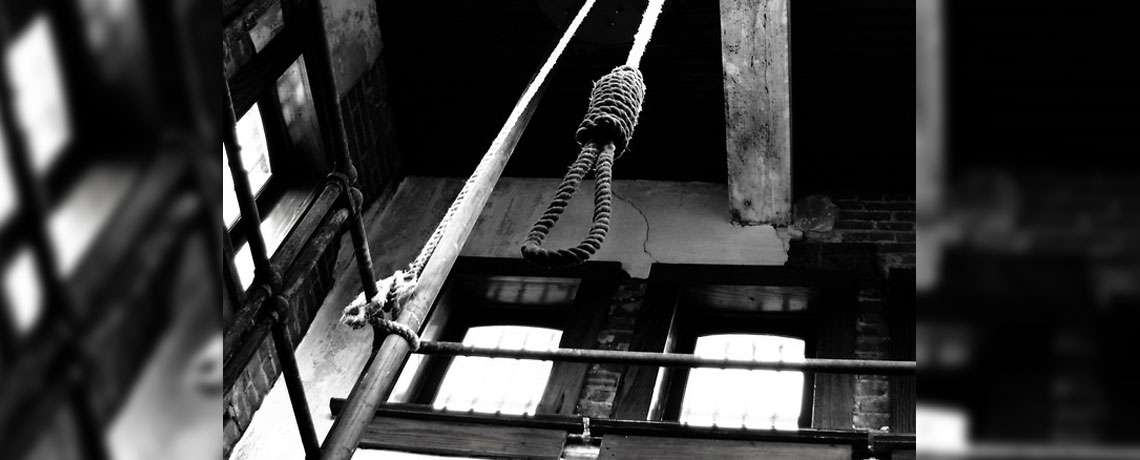Reply To:
Name - Reply Comment

The death penalty will be imposed on some 1,090 prisoners if this decision comes to effect
Church of Ceylon said it cannot condone the move to resume the execution of both those sentenced to death for drug related
Apart from hanging, beheading, lethal injection and shooting are also used as execution methods in the world
Meanwhile, the Department had also separated the convicted drug traffickers from other inmates to cutoff their supplies
 No one in the world is impeccable. Everybody makes mistakes. It’s the nature of human beings to commit mistakes. These mistakes can be classified either venial mistakes or grave mistakes. Some grave mistakes like killing, raping, drug trafficking and aborting etc. deserve grave penalties.
No one in the world is impeccable. Everybody makes mistakes. It’s the nature of human beings to commit mistakes. These mistakes can be classified either venial mistakes or grave mistakes. Some grave mistakes like killing, raping, drug trafficking and aborting etc. deserve grave penalties.
Overview of death penalty
Wikipedia highlights that Capital punishment, also known as the death penalty, is a government-sanctioned practice whereby a person is killed by the state as the punishment for a crime.
According to the Death Penalty Information Center (DPIC) which is a national non-profit organization serving the media and the public with analysis and information on issues related to capital punishment, 56 countries are using the death penalty at present while 142 countries have removed the death penalty in law or in practice.
Amnesty International reports that 23 countries carried out at least 993 executions last year (2017) which is less compared to the figure in 2016 that read as 1,032. The number of executions in 2015 was 1,634. However, the real figure is likely to be much higher.
China remained the world’s top executioner, but the true extent of the use of the death penalty in China is unknown as this data is classified as a state secret.
Amnesty International highlights that the death penalty breaches human rights, in particular the right to life and the right to live free from torture or cruel, inhuman or degrading treatment or punishment. Both rights are protected under the Universal Declaration of Human Rights, adopted by the UN in 1948.
Apart from hanging, beheading, lethal injection and shooting are also used as execution methods in the world.
Sri Lanka to resume death penalty
The death penalty has a long history in Sri Lanka. The British restricted the death penalty after they took control of the island in 1815 to the crimes of murder and ‘waging war against the King.’
After independence, then Prime Minister S. W. R. D. Bandaranaike abolished capital punishment in 1956. However, it was reintroduced after his assassination in 1959.
Records show that the year 1976 marked the last occasion when a person was subject to the death penalty in Sri Lanka.
The Cabinet of ministers has recently discussed imposing death penalty on drug traffickers, including prisoners who were already sentenced to death.
President Maithripala Sirisena stated on July 11 that he will endorse the plans to begin capital punishment following an alarming rise in the drug trade.
He noted that drug racketeers, who were convicted and serving jail terms, were continuing with their operations while in prison and called on the Justice Ministry to provide the names of individuals who had been sentenced to death regarding drug-related crimes.
A violation of human rights
Speaking to the Daily Mirror, former Human Rights Commissioner and senior lecturer at the Colombo University Law Faculty Dr. Prathiba Mahanamahewa said that imposing the death penalty on anyone was a grave violation of human rights. - Dr. Prathiba Mahanamahewa
We have also pledged to the United Nations not to impose the death penalty on anyone due to ethical and moral concerns. The year 1976 marked the last occasion when a Sri Lankan was subject to the death penalty
Dr. Mahanamahewa said that during the tenure of former President J.R. Jayewardene, Sri Lanka had signed and ratified the International Covenant on Civil and Political Rights, through which ‘right to life’ was recognised and protected.
“Although we signed the multilateral treaty, we have not ratified the Second Optional Protocol to the covenant which envisages the abolition of the death penalty. Therefore, the Government can impose the capital punishment though it’s a grave violation of the ‘right to life.’ Dr. Mahanamahewa said.
“We have also pledged to the United Nations not to impose the death penalty on anyone due to ethical and moral concerns. The year 1976 marked the last occasion when a Sri Lankan was subject to the death penalty. The death penalty will be imposed on some 1,090 prisoners if this decision comes to effect,” Dr. Mahanamahewa added.
However, he said it was important to ascertain from where these drugs are smuggled in, than to impose capital punishment on people.
“There are top officials involved in large-scale drug trafficking. The Government should take action against them immediately,” he said. Nevertheless, he said even the countries that have legalized capital punishment, have not been able to control the drug trafficking or condense murders and rape cases.
There is more to be done
Archbishop of Colombo Diocese Malcolm Cardinal Ranjith told a news briefing that there is more to be done to stop the criminals organising crimes while being in the prison in addition to subjecting them to capital punishment. - Malcolm Cardinal Ranjith
We understand that even prison officers also support the criminals to organise crime while in prison and therefore it’s our belief that political leadership of the country should carry out investigations
“We will support President Maithripala Sirisena’s decision to subject those who organise crime while being in the prison to a death sentence, but we also feel that there is more to be done,” Cardinal Ranjith said.
“We understand that even prison officers also support the criminals to organise crime while in prison and therefore it’s our belief that political leadership of the country should carry out investigations and penalize the prison officers as well if they are found to have helped the inmates to carry out various crimes,” he added.
Executive’s consent shouldn’t be a need
Attorney-at-law Nagananda Kodituwakku said that the death penalty should be implemented for drug traffickers.
He told the Daily Mirror that it was good to enforce the death penalty, but the executive branch should not interfere in this affair other than during exceptional circumstances.
“We have seen instances where the Executive unduly interferes into implementing the death penalty. The consent of the Executive should not be a requirement in forming the verdict for a death penalty on a convict. - Nagananda Kodituwakku
The consent of the Executive should not be a requirement in forming the verdict for a death penalty on a convict. It has to be decided in and through a court procedure without the interference of anybody
“It has to be decided in and through a court procedure without the interference of anybody,” Kodituwakku said.
“The majority of the prisoners are those who are involved in drug trafficking. Therefore, there should be an end to drugs which have become a huge threat to the country,” Kodituwakku added.
He added that even under the Customs Ordinance, it’s underscored that the death penalty should be handed to drug traffickers who are involved in large scale drug trafficking.
Further, Kodituwakku said that the death penalty should also be applicable for any person who has been convicted of death under the Penal Code of Sri Lanka.
‘No’ to death penalty
Prof. Ven. MedagodaAbayathissa Thera said that he was opposed to resuming death penalty.
“We are taught in the Buddhism not kill the person, but kill the fault. In that viewpoint, we are against this move. There is a lot to be done before bringing the death penalty,”Abayathissa Thera said.
“It’s necessary to find out the root causes for the existence of drugs and how they enter the country,” the monk added.
Abayathissa Thera said that the death penalty is carried out by failed states and added Sri Lanka had also fallen into that category. - Ven. MedagodaAbayathissa Thera
We are taught in the Buddhism not kill the person, but kill the fault. In that viewpoint, we are against this move. Priority should not be given to killing those who are involved in drug trafficking, but to ways and means to eradicate drugs from the society
“Priority should not be given to killing those who are involved in drug trafficking, but to ways and means to eradicate drugs from the society,” the Thera added.
Abayathissa Thera said that if the Government would impose the death penalty on those who organise crimes while being in the prison, it underscores inefficiency and bureaucracy on the part of the Prison Department, in their deals with inmates.
Meanwhile, The Human Rights Commission of Sri Lanka (HRCSL) in a letter addressed to President Maithripala Sirisena had requested to revoke his decision to enforce the capital punishment on drug traffickers and implement a powerful and long-term policy framework for the suppression of grave crimes, including drug trafficking.
The delegation of the European Union in Sri Lanka as well as the diplomatic missions of Canada and Norway have written to President Sirisena to verify the worrying information in the public domain about the intention of the Government of Sri Lanka (GoSL) to resume implementing the death penalty.
At the same time, the Church of Ceylon (Anglican Church) on Monday said it was against the death penalty and instead called on the Government to vigorously combat drug smuggling and distribution at all levels in the society.
Issuing a statement, the Church of Ceylon said it cannot condone the move to resume the execution of both those sentenced to death for drug related crimes and inmates continuing to be involved in the drug trade while in prison.
List of 18 convicts released
Prisons Spokesman Commissioner Thushara Upuldeniya said a list consisting names of 18 convicts, who were sentenced to death for drug-related crimes, was submitted to the Justice and Prison Reforms Ministry on July 13.
He said the security within the Prisons had been beefed up to curb drug smuggling by convicted drug traffickers.
He said the Prison Department had also limited the meals brought by outsiders to be given to such inmates, to prevent communication.
Meanwhile, the Department had also separated the convicted drug traffickers from other inmates to cutoff their supplies and connections with the outside world and other inmates.
According to the measures taken, the Department hoped to expand its intelligence and equip Prison Officers with better equipment.
Commissioner Upuldeniya added that the Department had planned to launch an awareness campaign targeting convicted drug traffickers to educate them over the harm created through drugs and discourage them from being involved in drug-trafficking.
Woman prisoner headed the list of the criminals, on death row, Justice and Prison Reforms Minister Thalata Athukorala
Justice and Prison Reforms Minister Thalata Athukorala airing her views at an event held in Kahawatta on Monday said that a woman prisoner headed the list of the criminals, on death row. They are to be hung.
The Minister also said that the country had already become a drug trafficking hub when the unity Government assumed power.
Meanwhile, the Prison Department announced last week, that it had called for applications to recruit two hangmen to carry out executions.
The department hired two hangmen in 2015, but they later resigned.
The Department spokesman said it had been a difficult task to recruit a hangman as most of them quit due to stress.
In conclusion, it’s apt to pose the question whether the Government has taken adequate steps to check the proliferation of drugs before starting the practice of using the death penalty.